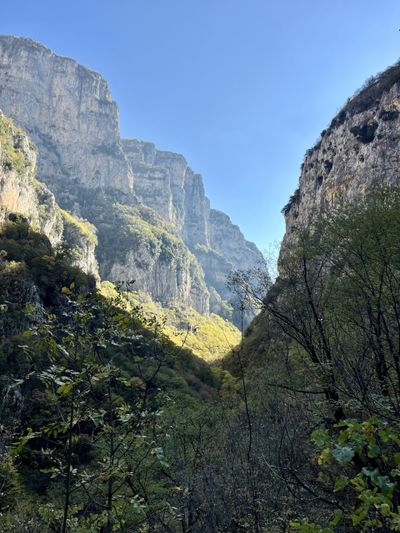Ammi Midstokke: Mining for hope in the world’s deepest gorge

I did not mean to be out of the U.S. for the elections, but I’m glad I was. Maybe it was a coincidence that I descended into the deepest, narrowest gorge on the planet, where the medicinal herbs of millennia still grow and the strongest medicine of all – no cell service – can be found.
None of it is enough to palliate the paroxysms of my internal storm. I cannot not speak to it.
The Vikos Gorge, carved into the Pindus Mountains of northern Greece, made its way into the Guinness Book of World Records in 1997. Gorge enthusiasts still battle about its validity, presumably because they have little else to do and only themselves to fight amongst. This particular chasm in the earth is about 20 miles long and split by a white ribbon of dry riverbed stones. The porous nature of the rock layers here means the water flows in some deeper strata until it trickles out of the Voidomatis Spring at just above freezing temperatures.
I read that gorges are symbolic of transition, or a test of determination. As I descend the steep canyon path into the cold shadow of cliffs, I know I need this one to be both. The optimist in me wonders if I’ll even find some hope to forage in the basin.
I consider myself a political ambivalent, a spiritual unknown, a values-accepting sort of citizen. But once I took an online quiz that said I was two clicks shy of Communist, so my personal assessment may not be the most reliable source of data. This revelation will come back to haunt me should I ever run for office claiming to be centrist. My point is, I see both sides. I respect the beliefs that land a person on one or the other.
It’s a late autumn here in Greece, the trees still aflame with hues of gold and red. When a breeze pours over the gorge walls, the branches tremble and rain a fluttering of leaves around me, leaving a soft carpet of yellow beneath my feet. I take a deep breath to see if they smell different from the alder and birch and cottonwood of my home. I know I’m escaping to, dissociating from. I silently beg (which I believe is known as “prayer” in some circles) for nature to bludgeon me with awe and wonder so I can forget the other chasm dividing my nation.
I’m not interested in blame, but understanding. Nor do I seek to reject other ideas, values, possibilities. I merely hope that everyone’s can be heard and given space. I thought that was what defined our country, though I know my “naïvist” approach to history is mostly grade school propaganda.
The plant diversity of the Vikos Gorge is what makes it unique. Nature has been allowed to thrive here rather independently of human interaction, but for a lone trail that descends into the canyon and clings to its damp walls. Years ago, practitioners came and harvested the unique herbs for medicines, but their practices were kept so close, the wisdom was lost. A museum with 2,500 dried herb species is all that remains.
Once in the gorge, it seems impossible to crawl out. High on the opposing walls, the afternoon sun lights up the stone with amber hues. The narrow canyon reflects the light back to the shady side, and while I can see more, it does nothing to warm my bones.
The only way out of the canyon is to traverse it. One side basking in solar warmth, like it’s the chosen child of our nearest star, the other destined to live in permanent shadow.
It is evident that no one side has more inherent value than the other. The craggy sun-baked side offers dry herbs and rare goats, the dewy emerald side grows lush leaves and the most delicate purple blossoms. The streams from both feed the river that emerges as the steep walls give way to sloping hills. Some etymologists suggest it derives its name after the clear blue eyes of oxen.
The hope I mine in the depths of this ravine is the same – that we may also emerge with such clarity and unity.
Ammi Midstokke can be contacted at ammim@spokesman.com